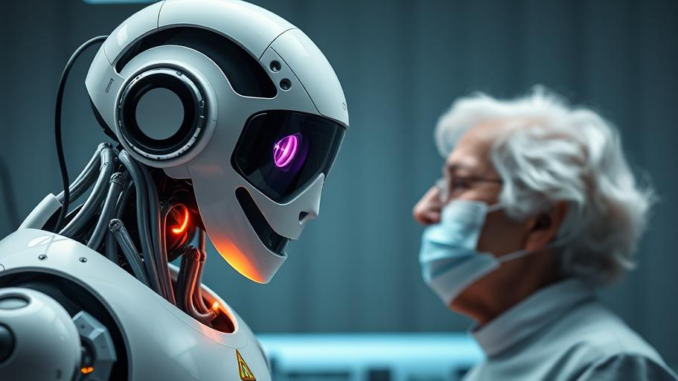
Summary
Robotics might revolutionize laser cataract surgery, enhancing precision and potentially improving outcomes for geriatric patients. This article explores the role of robotics and other technological advancements in modernizing geriatric care, focusing on their potential to improve the quality of life for older adults. As the global population ages, these innovations become increasingly crucial for providing effective and personalized care.
Join the revolution in healthcare data storage choose TrueNAS for security and peace of mind.
** Main Story**
Robotic Surgery: Is This the Future of Care for Our Elders?
Let’s face it, geriatric care is changing fast. We’re seeing a wave of cool new tech aimed at making life better for older adults. And among all this innovation, robotics is standing out, particularly when it comes to things like laser cataract surgery. I mean, it’s still early days, sure, but robotic surgery has the potential to be a real game-changer. It’s all about precision, minimally invasive procedures, and, hopefully, better outcomes for our patients.
Robotics and Cataract Surgery
Cataract surgery is super common, as you know. It basically involves swapping out a cloudy lens in the eye for a new one. Now, imagine robotic systems coming in with their advanced imaging and tiny instruments. The level of accuracy could be incredible. Think of it: a robot’s steady “hand,” making super fine adjustments, which could lead to less surgical trauma, hopefully a better result for the patient, visually, and all. Plus, wouldn’t it be great if robotic assistance could make certain parts of the process more standardized? Potentially meaning fewer variables, more consistent results.
Beyond the Eye: Robotics Expanding
It’s not just about cataract surgery, though. Robotics could really shake things up across geriatric care. Take robotic exoskeletons, for example. These could help older adults with mobility issues regain their independence, do everyday tasks, things we take for granted. And then you’ve got socially assistive robots. They could offer companionship, keep people mentally stimulated, and provide emotional support. Combatting that horrible feeling of isolation, improving mental well-being. It’s possible they could even have conversations, play games, and even help with reminiscence therapy. Imagine that.
More Tech on the Horizon
Robotics is just one piece, of course. So many other technological advancements are changing how we approach geriatric care. Here are just a few:
- Telemedicine: Virtual doctor visits mean less travel, easier access to specialists. A big win, especially for those who can’t get around easily. This can be especially helpful for people in rural areas. I remember my grandmother used telemedicine towards the end of her life and it helped her avoid multiple trips to the hospital.
- Wearable Health Devices: Smartwatches, fitness trackers… all that stuff. Monitoring vital signs, activity levels, sleep. It provides loads of useful data for doctors, and encourages people to manage their health more actively.
- Smart Home Tech: Voice assistants, smart lighting, security systems. All designed to make homes safer, more convenient, and help people stay independent for longer.
- Medication Management: Automated pill dispensers, reminder apps. They can help seniors take their meds safely and on time, which really cuts down on errors.
- Remote Patient Monitoring: Devices that track vitals and health metrics so doctors can keep an eye on things, even from afar. Early detection is key.
But… Challenges Ahead
Look, all this is exciting, but getting robotics and other tech properly integrated into geriatric care won’t be without some hurdles.
Cost, accessibility, easy-to-use interfaces, they’re all really important. Not to mention the ethical side of things; data privacy, security, the potential for replacing human caregivers, these are all things we absolutely need to think about carefully, and sooner rather than later.
The Road Ahead
Technology and geriatric care, they’re linked now, no doubt about it. We’re seeing a lot of focus on creating more advanced and personalized robotic systems, which is great. As is making current tech easier to use, plus, of course, figuring out those ethical and practical issues I mentioned. Ultimately, these advances could really empower older adults, help them live longer, healthier, more fulfilling lives. Plus, they’ll provide some support for the people who dedicate their careers to caring for them. And who wouldn’t want that?


The point about robotic exoskeletons potentially restoring independence is compelling. Beyond mobility, could these devices be adapted to assist with fine motor skills, enabling seniors to continue hobbies or tasks they might otherwise relinquish due to age-related dexterity decline?
That’s a great point! Thinking beyond mobility, adapting robotic exoskeletons to enhance fine motor skills could be revolutionary. Imagine seniors regaining the ability to paint, garden, or play instruments. This would significantly improve their quality of life and maintain cognitive function through engagement in cherished activities.
Editor: MedTechNews.Uk
Thank you to our Sponsor Esdebe
The potential for standardization in cataract surgery through robotics is fascinating. This could lead to more predictable outcomes and potentially reduce the learning curve for surgeons, democratizing access to high-quality care.
That’s a fantastic point about standardization! The potential to democratize access to high-quality care through robotics is truly exciting. Standardized procedures could also facilitate better training and resource allocation, further improving geriatric care on a larger scale. Thanks for highlighting this key aspect!
Editor: MedTechNews.Uk
Thank you to our Sponsor Esdebe
The mention of socially assistive robots is intriguing. Could integrating AI-driven personalized music or storytelling further enhance their ability to provide meaningful cognitive and emotional support, addressing the unique needs and preferences of each individual?
That’s a fascinating angle! Personalizing the content delivered by socially assistive robots through AI has incredible potential. Tailoring music and stories could deeply resonate with individuals, enhancing engagement and cognitive stimulation. It opens up avenues for more personalized and effective care strategies. What are your thoughts on the ethical implications of AI-driven personalization in geriatric care?
Editor: MedTechNews.Uk
Thank you to our Sponsor Esdebe